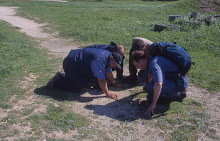
L’occidente è oppresso di letteratura. I letterati ci hanno convinti che ogni sapere si riconduce alla loro disciplina. Le parola sono importanti, ma le idee sono più importanti delle parole con cui vengono espresse. Alle parole si richiede solo di esprimere precisamente ed efficacemente le idee, e alla letteratura di fornire mezzi sufficientemente potenti per questo compito. Il risultato dell’iperenfatizzazione della letteratura è che oggi, che stiamo passando dalla società della parola alla società dell’immagine, noi contemporanei, abilissimi a parlare ma ignoranti di immagini, assistiamo a un collasso del pensiero. Vaglielo a dire a Baricco, che le immagini, teste Michelangelo o Leonardo o Picasso, non potessero essere piene di pensiero, e che non saperle maneggiare è dovuto al fatto che abbiamo la lingua troppo grossa e gli occhi troppo piccoli.
By the way, the collapse of ideas following the fall of the sovereignity of words affected visual arts too. The aesthetics of banal that reigns today is only incidentally related to the society of consumption. I suspect, it is more directly related to the passage from the society of words to the society of images. Visual art, in particular contemporary art, is a very sophisticated language, that has been refined and perfectioned in three centuries and that in the last 50 years has become largely independent of literal expression of ideas – the reason for its “difficulty”. The aesthetics of banal tries to be understandable to people that manage well the speech, but not so well the images – I cannot see much difference between Jeff Koons and Duchamp, apart from the fact that Duchamp cannot be expressed properly in words, whereas Koons can be translated in words. Koons, Freud, Hirst, are Charons, ferrying literary people in the Hell of Images, already explored by Giotto, Tiziano, Vélazquez, Van Gogh and Yves Klein.
By the way, the collapse of ideas following the fall of the sovereignity of words affected visual arts too. The aesthetics of banal that reigns today is only incidentally related to the society of consumption. I suspect, it is more directly related to the passage from the society of words to the society of images. Visual art, in particular contemporary art, is a very sophisticated language, that has been refined and perfectioned in three centuries and that in the last 50 years has become largely independent of literal expression of ideas – the reason for its “difficulty”. The aesthetics of banal tries to be understandable to people that manage well the speech, but not so well the images – I cannot see much difference between Jeff Koons and Duchamp, apart from the fact that Duchamp cannot be expressed properly in words, whereas Koons can be translated in words. Koons, Freud, Hirst, are Charons, ferrying literary people in the Hell of Images, already explored by Giotto, Tiziano, Vélazquez, Van Gogh and Yves Klein.

Nessun commento:
Posta un commento